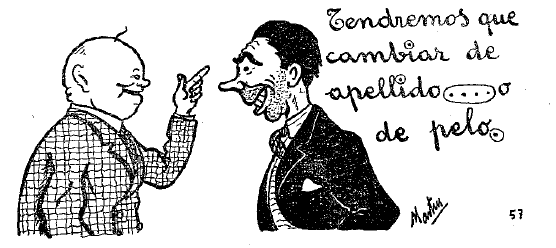
| Языки :: Испанский |
| Аудио |
 |
|
|
159 |
Español |
Spanish |
|
Lección Cincuenta y siete (57) |
||
| Rubio y moreno | Fair and dark (-haired). | |
| 1 |
Desde anoche estoy en la "Pensión franco-suiza", que no tiene nada de francés ni de suizo, |
Since yesterday, I am at the "Franco-Swiss Boarding-House" which has nothing French [n]or Swiss, |
| 2 |
pues el dueño y los huéspedes son españoles; yo soy aquí el único extranjero. |
for the owner and boarders are Spanish; I am the only foreigner here. |
| 3 |
Hay algunos estudiantes (1), un teniente y un abogado,
que son estables, y dos matrimonios de provincias que visitan Madrid. |
There are a few students, a lieutenant and a barrister, who are permanent (boarders) and 2 provincial couples who visit M. |
| 4 | Aunque se come en mesas independientes, la conversación es general, y la cena de anoche fue muy animada. | Although people eat at separate tables, the conversation is general, and the dinner of yesterday night was very lively. |
| 5 | Me colocaron en la misma mesa que al abogado, y pronto entramos en conversación. | They placed me at the same table with [at] the barrister, and soon we entered into conversation. |
| 6 |
Después de cambiar algunas frases, me dió su tarjeta (2) : "Enrique Rubio", y yo le di la mía : "Pierre Lebrun". |
After exchanging a few sentences, he gave me his card : Henry Rubio, and I gave him mine : Pierre Lebrun. |
| 7 |
He olvidado casi todo el francés que aprendí en el colegio, me dijo, pero supongo que Pierre en francés es lo mismo que Pedro en español. |
I've forgotten almost all the French that I learned at school, be said to me, but I suppose that Pierre, in French, is the same as Pedro in Spanish. |
| 8 |
Sí, contesté. Es un nombre muy corriente en todos los países. |
Yes, I answered, it's a very current Christian name in all countries. |
| 9 |
¿Y el apellido de usted, qué significa? ¿El moreno? — Efectivamente. |
And your family name, what does it mean? The dark (one)? — (It does) indeed. |
| 10 |
¡Qué casualidad (3)! Me llamo Rubio, y soy moreno, y usted se llama Moreno, y es rubio. |
What a coincidence [chance]! I'm called [(they) call me] "fair" and I am dark, and you're called " dark" and you are fair. |
| 11 | Tenemos que cambiar de apellido... o de pelo (4). | We must [have that] change [of] name(s)... or hair(s). (3) |
| EJERCICIOS | EXERCISE : | |
| 1 | (Frases sueltas para practicar el verbo dar). | Separate sentences, to practice (on) the verb dar (to give). |
| 2 | Yo le doy a usted mi palabra de que no lo sabía. | I give you my word [of] that I did not know it. |
| 3 | ¡Qué me da usted? | What do you give me? |
| 4 | Déme este mechero, ¡démelo! | Give me this lighter, give it to me! |
| 5 | Yo daré más de lo que he prometido. | I shall give more than [of that which] I have promised. |
| 6 | ¿Me dará usted tiempo? | Will you give me time? |
| 7 | Yo le di las ochenta pesetas y él me dio un recibo. | I gave him the 80 p,, and he gave me a receipt. |
| 8 | Todo lo que le daba yo, lo daba él a su primo. | All that I gave him he was giving (or would give) [it] to his cousin. |
| 9 | (Yo) les he dado mi parecer. | I have given them my opinion. |
| 10 | Ahora daremos una vuelta por ahí. | Now we shall take [give] a stroll this way [by here]. |
| NOTES. | |
| 1 | Un estudiante, una estudianta, a (boy-), (girl-) student. |
| 2 |
La tarjeta (tárHayta), the card; la tarjeta postal, the post-card, but one says familiarly : una postal; una (tarjeta) postal ilustrada, an illustrated p.c. |
| 3 |
Pron. : casswáleeda. — By chance, por casualidad or casualmente. |
| 4 |
El pelo, the hair (on head or body); el cabello, los cabellos also mean the hair, hairs (on the head only), but are less current and slightly pretentious. |
|
Now, study tte first lesson over again (Alberto va a Paris) in
the manner indicated less. 56, par, 1. Owing to the special arrangement of (he text take a sheet of paper to mask the Spanish text and pronunciation when you translate the English sentences into Spanish. |
